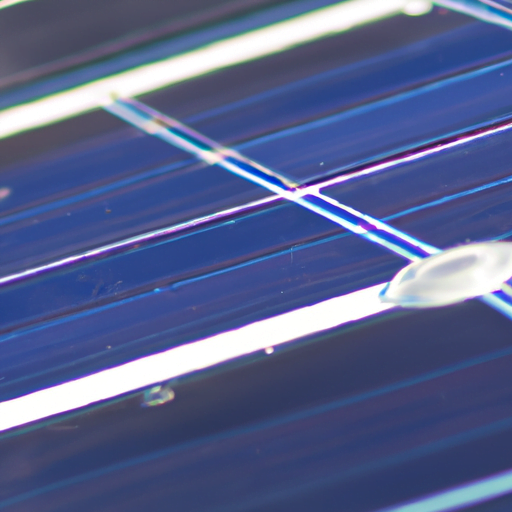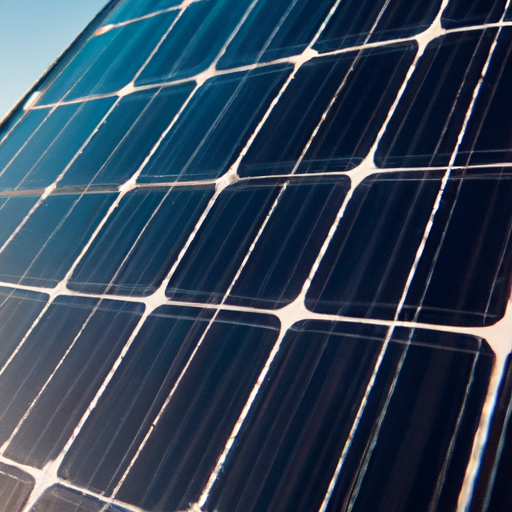Hey there! Have you ever wondered what would happen if you left a solar panel disconnected in the sun? Well, let’s dive into the topic of living off the grid and explore the impacts of leaving a solar panel disconnected.
Living off the grid has become increasingly popular in recent years, as people seek to reduce their environmental footprint and save on energy costs. Solar panels are a key component of living off grid, as they harness the power of the sun to generate electricity. But what happens if you accidentally disconnect a solar panel from the rest of the system and leave it exposed to the sun?
Leaving a solar panel disconnected in the sun can have a couple of effects. First, without being connected to the rest of the system, the panel won’t be able to generate electricity to power your appliances or charge your batteries. Second, prolonged exposure to the sun without proper ventilation or cooling can lead to overheating, which can potentially damage the panel.
To learn more about the impacts of leaving a solar panel disconnected in the sun and how to avoid any potential problems, keep reading the article. We’ll dive deeper into the topic and provide you with some helpful tips and insights.

What does it mean to live off grid?
Living off-grid refers to a lifestyle where individuals or households are not connected to the main electricity grid. Instead, they rely on alternative sources of power, such as solar panels, wind turbines, or generators, to meet their energy needs. This self-sustaining lifestyle allows individuals to become more independent and reduce their reliance on traditional power sources.
Definition of off-grid living
Living off-grid means living without the need for utility-provided electricity. Off-grid homes are typically designed to be self-sufficient, generating their own power through renewable energy sources. These homes are not connected to the electrical grid, which means they do not rely on utility companies for their electricity supply.
Benefits of living off grid
Living off grid offers numerous advantages. First and foremost, it provides individuals with energy independence. Rather than being subjected to power outages or fluctuations in utility prices, those who live off grid have control over their energy production and consumption.
Additionally, living off grid reduces the carbon footprint. Traditional electricity generation relies heavily on fossil fuels, which contribute to greenhouse gas emissions and air pollution. Generating power from renewable energy sources, such as solar panels, allows individuals to reduce their environmental impact.
Off-grid living also promotes self-sufficiency. By relying on their own energy systems, individuals become more conscious of their energy consumption habits and find ways to maximize energy efficiency. This lifestyle often leads to a greater appreciation for nature and a more sustainable way of living.
Understanding solar panels
Solar panels are a common and efficient way of generating electricity in off-grid systems. They harness the power of the sun through photovoltaic cells to convert sunlight into electricity.
How do solar panels work?
Solar panels work by utilizing the photovoltaic effect. When sunlight hits the solar panel’s photovoltaic cells, it creates an electric current. This direct current (DC) is then converted into alternating current (AC) through an inverter, making it suitable for household use.
Components of a solar panel system
A solar panel system consists of several components that work together to generate and distribute electricity. These include:
- Solar panels: The main component that captures sunlight and converts it into electricity.
- Inverter: Converts DC electricity from the solar panels into AC electricity for use in the home.
- Charge controller: Regulates the flow of electricity from the solar panels to the battery bank, preventing overcharging or damage.
- Battery bank: Stores excess electricity produced by the solar panels for use during times when there is no sunlight.
- Electrical panel: Distributes electricity from the inverter to power various appliances and devices in the home.
The impact of leaving a solar panel disconnected
While solar panels are designed to operate independently, leaving a solar panel disconnected from an off-grid system can have negative consequences.
Potential issues with leaving a solar panel disconnected
When a solar panel is disconnected, it is not generating electricity. This can lead to a decrease in energy production and potential issues with the overall performance of the solar panel system. Additionally, when a solar panel is not connected to a charge controller or battery bank, the excess electricity generated cannot be stored for later use.
Effects on the solar panel’s performance
Leaving a solar panel disconnected can impact its long-term performance. Solar panels are designed to withstand varying weather conditions and continuous operation. However, when not in use, the panel may be exposed to environmental factors that can degrade its efficiency and lifespan. Harsh weather, such as extreme heat or cold, can cause damage to the panel over time.

Negative consequences of leaving a solar panel disconnected
Leaving a solar panel disconnected can have several negative consequences for off-grid living.
Decreased energy production
The primary purpose of a solar panel is to generate electricity. When a solar panel is disconnected, it cannot fulfill this function. This means that the household’s energy needs will not be met, leading to a decreased energy production and a potential reliance on alternative energy sources, such as generators or batteries.
Reduced battery lifespan
In off-grid systems, batteries are essential for storing excess electricity generated by the solar panels. When a solar panel is disconnected, the battery bank receives no charge, resulting in reduced battery lifespan. Batteries that are not regularly charged or discharged can lose their capacity over time, leading to decreased energy storage and the need for battery replacement sooner than expected.
Potential damage to the solar panel
Leaving a solar panel disconnected exposes it to potential damage. Weather elements, pests, or other external factors can harm the panel if it is left unprotected and unattended. Extreme temperatures, excessive moisture, or physical damage can impact the panel’s performance and longevity.
Factors to consider
When considering leaving a solar panel disconnected in an off-grid system, several factors should be taken into account.
Duration of disconnection
The duration of the disconnection is an essential factor to consider. If it is only for a short period, the impact on energy production and the panel’s performance may be minimal. However, if the disconnection is for an extended period, the consequences can be more significant.
Weather conditions
The weather conditions in the area play a crucial role in determining the impact of leaving a solar panel disconnected. Extreme heat, cold, or humidity can affect the panel’s performance and durability. Proper protection, such as covers or shelter, may be necessary to minimize potential damage.
Panel orientation and tilt
The orientation and tilt of the solar panel can also affect its overall performance. To maximize energy production, solar panels should be properly angled towards the sun’s path. If a panel is left disconnected and unable to adjust its position, it may not capture sunlight as efficiently, resulting in decreased energy production.
Maintaining an off-grid solar panel system
To maintain an effective off-grid solar panel system, regular inspections and cleanings are essential.
Regular inspections and cleanings
Regular inspections of the solar panel ensure that it is functioning optimally. Cleaning the panel surface, checking for any damage or debris, and verifying the integrity of the wiring connections are necessary maintenance tasks. By keeping the solar panel clean and in good condition, its performance and efficiency can be maximized.
Monitoring energy output
Monitoring the energy output of the solar panel system is crucial to ensure it is generating sufficient electricity. Regularly checking the energy production can help identify any issues or discrepancies in performance. Monitoring systems, such as energy meters or online platforms, can provide real-time data and help track the system’s overall health.
Proper storage and maintenance of batteries
In an off-grid solar panel system, batteries are vital for storing excess energy. Proper storage and maintenance of batteries are crucial to ensure their longevity and optimal performance. This includes regular inspections, cleaning of terminals, and ensuring proper charging and discharging cycles.
Advantages of keeping solar panel connected
Keeping a solar panel connected at all times has several advantages for off-grid living.
Continuous energy production
By keeping the solar panel connected, it can continue to generate electricity consistently. This ensures a continuous supply of power for daily household needs, regardless of the weather conditions. Continuous energy production eliminates the need for alternative energy sources and enhances the overall sustainability of the off-grid system.
Optimal battery charging
When a solar panel is connected, it continuously charges the battery bank, ensuring optimal battery charging. Regular charging and discharging cycles maintain the battery’s health and capacity, prolonging its lifespan. This reduces the need for frequent battery replacements and minimizes costs in the long run.
Long-term cost savings
Keeping a solar panel connected allows for long-term cost savings. By relying solely on solar energy, individuals can significantly reduce or eliminate their electricity bills. The initial investment in a solar panel system may seem high, but the long-term savings accrued through reduced energy consumption and cost savings make it a worthwhile investment.
Possible alternatives
If leaving a solar panel disconnected is required, there are possible alternatives to consider.
Using a solar charge controller
A solar charge controller can be used to regulate the flow of electricity from the disconnected solar panel to the battery bank. By implementing a solar charge controller, individuals can ensure that the excess electricity generated by the panel is appropriately stored and utilized.
Implementing automation systems
Automation systems can also be utilized to monitor and control the solar panel’s connectivity. These systems can automatically connect and disconnect the solar panel based on predetermined conditions such as weather, battery charge levels, or energy demand. Implementing automation systems ensures that the solar panel is connected only when necessary, optimizing energy production and battery health.
Environmental impact
Leaving a solar panel connected in an off-grid system has a positive environmental impact.
Reduced carbon footprint
By generating electricity from renewable energy sources like solar panels, individuals reduce their reliance on fossil fuel-based power sources. This reduction in carbon emissions contributes to a healthier environment and a reduced carbon footprint. Off-grid living with connected solar panels is a sustainable way to minimize greenhouse gas emissions and combat climate change.
Renewable energy contribution
Connected solar panels contribute to the generation of renewable energy. By relying on sun-derived power, individuals are actively participating in the transition towards a clean energy future. The energy production from solar panels helps promote renewable energy adoption and supports the growth of the sustainable energy sector.
Conclusion
When considering off-grid living with solar panels, it is crucial to keep the solar panel connected whenever possible. Leaving a solar panel disconnected can result in decreased energy production, reduced battery lifespan, and potential damage to the solar panel itself. Factors such as the duration of disconnection, weather conditions, and panel orientation should be considered. Maintaining the solar panel system through regular inspections, cleanings, and proper battery storage and maintenance is essential for optimal performance. Furthermore, keeping the solar panel connected provides continuous energy production, optimal battery charging, and long-term cost savings. Alternative solutions such as solar charge controllers and automation systems can be considered when disconnection is necessary. Overall, living off grid with a connected solar panel contributes to a reduced carbon footprint and promotes renewable energy usage, helping to create a sustainable future.




